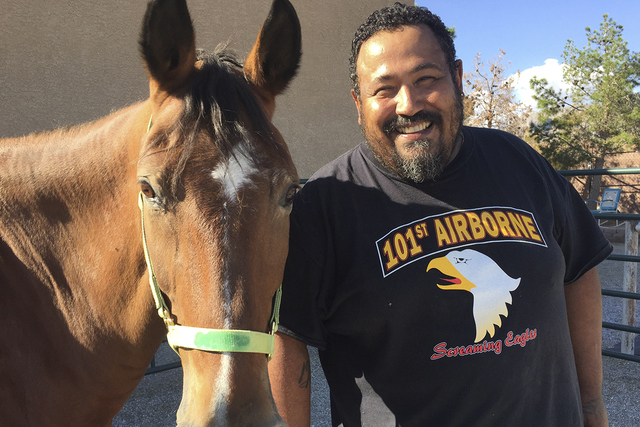Therapeutic horsemanship program helps veterans ride out PTSD symptoms

A dog and now a horse have made a huge difference for Ben Hernandez in his battle with post-traumatic stress disorder.
The Gulf War veteran says the calming influence of a black Labrador retriever named Wasabi that he’s experienced over the past six years has recently been enhanced by Pablo, a mustang he’s been working with through a therapeutic horsemanship program aimed at helping military vets conquer the mental demons spawned by their service.
“I enjoy being around the surrounding,” Hernandez said of the Spirit Therapies corral in the northwest Las Vegas Valley, where the program is held, stroking Pablo’s coat as he talked. “I don’t have to be afraid or anything like that, or too anxious.”
Hernandez, 48, is among four veterans with PTSD and anger-management issues who are taking the innovative course funded by the Department of Veterans Affairs, which uses horses like Pablo in a metaphoric healing program.
Hernandez traces his PTSD to the early days of the Gulf War, when he was a member of the Army’s 101st Airborne Division’s 502nd Infantry Regiment. After being targeted in an accidental friendly fire attack and then subjected to an enemy artillery bombardment in early 1991, he and his fellow soldiers were exposed to a horrific scene: the burned bodies of Iraqi soldiers strewn along what later became known as the Highway of Death, leading from Kuwait into Iraq.
“We did a low flight through there, and you could see the figures of charcoal bodies. It was a massacre. All that basically got into my head,” he said.
After leaving the service and returning stateside, Hernandez was diagnosed with PTSD and depression. He underwent counseling and was prescribed antidepressants, which alleviated his dark and suicidal thoughts somewhat.
But his biggest breakthrough came when he received Wasabi. Trained through Project HEAL, she responds to 80 commands, opens doors for him and wakes him when nightmares make him scream in his sleep.
His experiences with Pablo in the horsemanship program have taken his recovery to a new level, Hernandez said.
Every Friday morning for the past six weeks, he and his fellow veterans have groomed the horses, walked them through obstacle courses and watched how they reacted when a big inflatable ball – meant to symbolize the mental burden each veteran bears – was tossed into the air.
When it was Hernandez’s turn on a recent Friday, he walked to the center of the corral, picked up the gray ball with both hands and hurled it 20 feet over his head. When it smacked the dirt, all the horses except Pablo were spooked.
“Pablo’s like, ‘whatever,’” the bearded, barrel-chested Hernandez said before unleashing a burst of laughter.
“It felt good,” he said of the exercise. “New beginnings. That’s what I’m thinking.”
Mental health specialists from the Department of Veterans Affairs were there to observe and assess the veterans’ progress.
Mindi Hunsaker, a VA recreational therapist, said the horses help the vets get in touch with their feelings.
“So when the veteran goes, ‘Oh, the horse is kind of nervous today,’ well, it’s usually the veteran that’s nervous. The horse is matching the emotion,” she said.
VA psychologist Barb Wells said the natural beauty of a horse also has a healing quality.
“Looking at the bay coat of Pablo and watching the light dance off of it, it’s almost a mindfulness exercise when you can be just so enthralled with what you see,” she said, adding that the scents at the stable also are “very calming.”
Laurie Willmott, founder of the nonprofit Spirit Therapies facility off La Madre Way in northwest Las Vegas, said the veterans also “see themselves in a different light when they have to deal with a big huge animal.”
“What I’m seeing with these guys is they’re leaving here happier, calmer, safe, wanting to come back,” she said.
Funding for the program is provided through VA grants. It costs about $3,000 to send 10 veterans through the program, which is certified by the Professional Association of Therapeutic Horsemanship International.
Hernandez said he believes the expense is worth it because the program helps troubled vets regain trust in others.
“He trusts me. I trust him,” he said of Pablo. “He’s knows what’s behind me. He’s watching my back.”
Contact Keith Rogers at krogers@reviewjournal.com or 702-383-0308. Find him on Twitter: @KeithRogers2